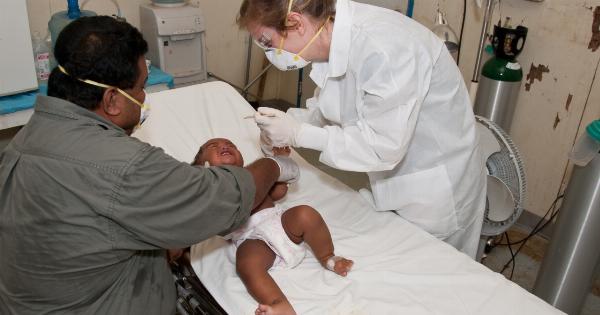Kidney infection, also known as pyelonephritis, is a serious medical condition that requires timely treatment to prevent complications. It occurs when bacteria travel up to the kidneys from the bladder and cause an infection.
While kidney infections are more common in women, anyone can develop the condition. In this article, we will discuss the symptoms of kidney infection and how to spot them early.
1. Pain in the Back, Side, and Groin
One of the most common symptoms of a kidney infection is pain in the back, side, and groin. The pain can vary in intensity, but it is often described as a dull ache that worsens over time.
You may also experience tenderness in the affected area, which can make it difficult to move or perform everyday activities.
2. Fever and Chills
Kidney infections can cause fever and chills, as the body tries to fight off the infection. You may have a high temperature, which can make you feel hot and sweaty. Alternatively, you may experience chills, which can make you feel cold and shivery.
3. Nausea and Vomiting
Kidney infections can also cause nausea, vomiting, and loss of appetite. These symptoms occur as the body tries to get rid of the infection and can be particularly distressing if you are already feeling unwell.
You may also feel weak and fatigued, which can make it difficult to carry out everyday tasks.
4. Urinary Symptoms
In addition to the above symptoms, kidney infections can also cause urinary symptoms such as frequent urination, pain or burning sensation during urination, and cloudy or foul-smelling urine.
If you have these symptoms along with the other symptoms mentioned above, it is essential to seek medical attention as soon as possible.
5. Blood in Urine
In some cases, kidney infections can cause blood in the urine. This is a sign that the infection has progressed to the point where it is causing damage to the kidneys or other parts of the urinary tract.
If you notice blood in your urine, it is essential to seek medical attention immediately.
6. Swelling in the Lower Body
In rare cases, kidney infections can cause swelling in the feet, ankles, and legs. This occurs as the infection spreads and causes inflammation in the tissues and blood vessels.
If you notice swelling in your lower body, it is essential to seek medical attention immediately, as this can be a sign of a severe kidney infection requiring urgent treatment.
7. Confusion and Delirium
In severe cases, kidney infections can cause confusion, delirium, and in some cases, even seizures. This occurs as the infection progresses and affects the brain and nervous system.
If you or someone you know is experiencing confusion or delirium, it is essential to seek medical attention immediately.
8. Risk Factors for Kidney Infections
While anyone can develop a kidney infection, certain factors can increase your risk. These include:.
- Gender: Women are more likely than men to develop kidney infections, due to their shorter urinary tract.
- Pregnancy: Pregnant women are more susceptible to kidney infections due to changes in their urinary tract and immune system.
- Urinary tract abnormalities: Structural problems in the urinary tract, such as kidney stones or enlarged prostate, can increase your risk of developing kidney infections.
- Catheter use: If you use a catheter to empty your bladder, you are at an increased risk of developing kidney infections.
- Urinary tract infections: If you have a urinary tract infection that is left untreated, it can spread to the kidneys and cause a kidney infection.
- Immune system problems: If you have a weakened immune system due to illness or medication, you are more susceptible to developing kidney infections.
9. Treatment for Kidney Infections
If you suspect that you have a kidney infection, it is essential to seek medical attention immediately.
Your doctor may perform a urine test to check for the presence of bacteria and may also order imaging tests such as an ultrasound or CT scan to check for any abnormalities in your urinary tract.
Treatment for kidney infections typically involves a course of antibiotics to clear the infection. In severe cases, you may need to stay in the hospital to receive intravenous antibiotics.
You may also need pain relief medication to manage the pain and discomfort associated with the infection.
If you have a structural abnormality in your urinary tract, you may need surgery to correct the problem and prevent future kidney infections.
10. Prevention of Kidney Infections
There are several steps you can take to reduce your risk of developing a kidney infection:.
- Practice good hygiene: Wash your hands regularly, and wipe from front to back after using the toilet to prevent bacteria from entering your urinary tract.
- Stay hydrated: Drink plenty of water to flush out bacteria and keep your urinary tract healthy.
- Practice safe sex: Use condoms to reduce your risk of contracting sexually transmitted infections, which can lead to kidney infections.
- Empty your bladder frequently: Don’t hold urine in your bladder for an extended period, as this can increase your risk of developing a urinary tract infection.
- Take antibiotics as prescribed: If you have a urinary tract infection, make sure to take the full course of antibiotics prescribed by your doctor to prevent the infection from spreading to your kidneys.
Conclusion
Kidney infections can be a serious medical condition that requires prompt treatment to prevent complications.
If you suspect that you have a kidney infection or are at risk of developing one, it is essential to take steps to prevent and manage the condition. By recognizing the symptoms of kidney infections early and seeking medical attention as soon as possible, you can minimize the impact of this condition and protect your overall health.


























